The problem is in Polygon::FindAxisLeastPenetration:
double Polygon::FindAxisLeastPenetration(unsigned int *faceIndex, const Polygon &polygonA, const Polygon &polygonB) const {
double bestDistance = -std::numeric_limits<double>::infinity();
unsigned int bestIndex;
for (unsigned int i = 0; i < polygonA.points.size(); i++) {
Vector2D n = polygonA.normals[i];
Vector2D nw = polygonA.rotationMatrix * n; //ROTATION
Matrix22 buT = polygonB.rotationMatrix.Transposed();
n = buT * nw; //ROTATION
Vector2D support = polygonB.points[polygonB.GetSupport(-n)];
Vector2D vertex = polygonA.points[i];
vertex = polygonA.rotationMatrix * vertex; //ROTATION
vertex.Add(polygonA.body->GetPosition());
vertex.Subtract(polygonB.body->GetPosition());
vertex = buT * vertex; // ROTATION
double distance = n.DotProduct(support - vertex);
if (distance > bestDistance) {
bestDistance = distance;
bestIndex = i;
}
}
*faceIndex = bestIndex;
return bestDistance;
}
unsigned int Polygon::GetSupport(const Vector2D &dir) const {
double bestProjection = -std::numeric_limits<double>::infinity();
unsigned int bestIndex = 0;
for (unsigned int i = 0; i < points.size(); i++) {
Vector2D vertex = points[i];
double projection = vertex.DotProduct(dir);
if (projection > bestProjection) {
bestProjection = projection;
bestIndex = i;
}
}
return bestIndex;
}
Manifold Polygon::CheckCollision(const Polygon &polygonA, const Polygon &polygonB) const {
Manifold result;
result.objectA = polygonA.body;
result.objectB = polygonB.body;
unsigned int indexA;
double penetrationA = Polygon::FindAxisLeastPenetration(&indexA, polygonA, polygonB);
if (penetrationA >= 0.0) {
result.intersects = false;
return result;
}
unsigned int indexB;
double penetrationB = Polygon::FindAxisLeastPenetration(&indexB, polygonB, polygonA);
if (penetrationB >= 0.0) {
result.intersects = false;
return result;
}
result.intersects = true;
//...
return result;
Rectangle::Rectangle(double width, double height) : Polygon() {
double hw = width / 2.0;
double hh = height / 2.0;
points.push_back(Vector2D(-hw, -hh));
points.push_back(Vector2D(hw, -hh));
points.push_back(Vector2D(hw, hh));
points.push_back(Vector2D(-hw, hh));
// points.push_back(Vector2D(0, 0));
// points.push_back(Vector2D(width, 0));
// points.push_back(Vector2D(width, height));
// points.push_back(Vector2D(0, height));
normals.push_back(Vector2D(0.0, -1.0));
normals.push_back(Vector2D(1.0, 0.0));
normals.push_back(Vector2D(0.0, 1.0));
normals.push_back(Vector2D(-1.0, 0.0));
center.x = 0;
center.y = 0;
}
polygon.rotationMatrix is an object of type Matrix22 which is a 2x2 matrix.
polygon.points is std::vector<Vector2D> filled with vectors.
polygon.body is a pointer to an Object instance. In this case it's only used to get position.
polygon.body->position is an instance of Vector2D containing X and Y coordinates.
Vector2D polygon.body->GetPosition() returns position vector of a body.
It works fine, except that the rotation is done around the [0, 0] point
but it's supposed to rotate around the center of mass.
I know that rotation around a point can be done like this:
rotationMatrix * (vertex - point) + point
And it works fine when rendering polygons. But not in collision detection.
How do I rotate vectors around a certain point in this case?
EDIT: Here's what I have so far
double Polygon::FindAxisLeastPenetration(unsigned int *faceIndex, const Polygon &polygonA, const Polygon &polygonB) const {
double bestDistance = -std::numeric_limits<double>::infinity();
unsigned int bestIndex;
for (unsigned int i = 0; i < polygonA.points.size(); i++) {
// Calculate normal
unsigned int j = i == points.size() ? 0 : i + 1;
Vector2D n;
// Rotate points
Vector2D p1 = polygonA.rotationMatrix * (polygonA.points[i] - polygonA.Center()) + polygonA.Center();
Vector2D p2 = polygonA.rotationMatrix * (polygonA.points[j] - polygonA.Center()) + polygonA.Center();
n.x = p2.y - p1.y;
n.y = -(p2.x - p1.x);
n.Normalize();
Vector2D support = polygonB.points[polygonB.GetSupport(-n)];
support = polygonB.rotationMatrix * (support - polygonB.Center()) + polygonB.Center();
support.Add(polygonB.body->GetPosition());
Vector2D vertex = polygonA.points[i];
vertex = polygonA.rotationMatrix * (vertex - polygonA.Center()) + polygonA.Center(); //ROTATION
vertex.Add(polygonA.body->GetPosition());
double distance = n.DotProduct(support - vertex);
if (distance > bestDistance) {
bestDistance = distance;
bestIndex = i;
}
}
*faceIndex = bestIndex;
return bestDistance;
}
unsigned int Polygon::GetSupport(const Vector2D &dir) const {
double bestProjection = -std::numeric_limits<double>::infinity();
unsigned int bestIndex = 0;
for (unsigned int i = 0; i < points.size(); i++) {
Vector2D vertex = rotationMatrix * (points[i] - center) + center;
double projection = vertex.DotProduct(dir);
if (projection > bestProjection) {
bestProjection = projection;
bestIndex = i;
}
}
return bestIndex;
}
Right now I don't really care about optimizations. There's sill the same problem. When rotating around the center collisions aren't being detected properly. However, if the center is [0, 0] or it's not used, then collision detection works properly, but again rotation is being performed wrong.
Edit: Even when rotating before collision detection, I get the same problem.
The best approach so far was to translate polygon so that its center would be at [0, 0], but at some angles collisions aren't being detected. Have no idea what to do now.
Edit: Screenshots (polygons are being translated so that their centers of mass are always at [0, 0], polygons are rectangles in this case)
Collision detection didn't work well here

Collision detection didn't work well here too

Collision detection worked well here

Edit: I added the Rectangle class.